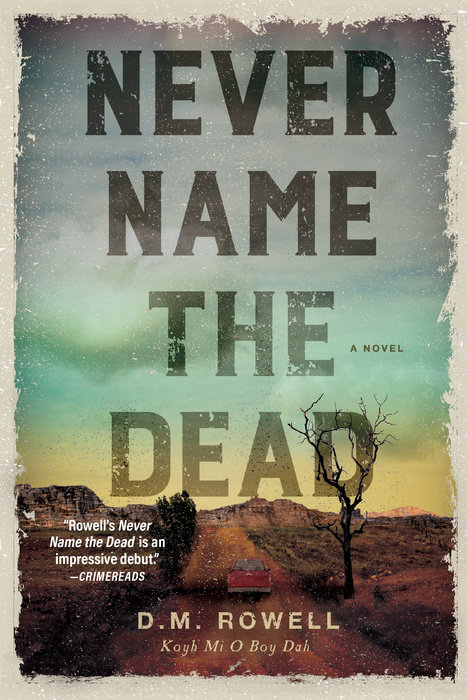
D.M. Rowell (Koyh Mi O Boy Dah) has brought two worlds together in her debut mystery novel, Never Name the Dead. Rowell connects her story from Silicon Valley to Kiowa tribal lands in Oklahoma through her lead character, Mae “Mud” Sawpole. The novel, the first in a series, was recently nominated for the Mary Higgins Clark Award by Mystery Writers of America. Mae runs a PR firm in Silicon Valley, but a strange call from her grandfather James leads her to catch a plane and head back home to her tribal homeland. While a lot of the novel shows Mae busy at work, working the phones back in California, the real heart of the book is her amateur detective skills in Oklahoma.
The mystery kicks into gear when James doesn’t appear at the airport to pick up Mae, or Mud as she’s known back with her Kiowa family and friends. Things get hotter when we see a video of James stealing a Jefferson Peace Medal from the local museum. James has disappeared and Mud has limited time to clear her grandfather’s name. Adding to the drama, we learn that someone has been stealing precious tribal artifacts and many Kiowa members have been forced to sell precious family objects to stave off poverty and financial insecurity. We also learn that the community has concerns about illegal fracking on the outskirts of its lands. However, the central plot twist occurs when a man is found dead in James’s studio and suspicion for the crime falls on Mud’s missing grandfather.
In reviewing any mystery, it’s important not to delve too deeply beyond these surface details, for fear of giving away precious clues to the reader. Rowell’s strength in this book is allowing us to enter the beautiful and mysterious world of the Kiowa people. Readers learn about their folklore, their myths, and their rituals, including the reference to not naming the dead, for fear that the soul will return to the body. We also connect to Mud’s perspective as an outsider, torn between two worlds throughout the book. I loved her directness as she pursues clues in the case, which often put her at odds with tribal leadership: “I knew I had broken one of our tribe’s unspoken taboos: Do not be direct, especially to an elder.” Mud is also a lesbian, who is walking a tightrope between her history and love for her people, her public relations tenacity, and her private heartaches and rejections from her tribal past. All of these things inform her work as an amateur detective. The fun in this book is watching her negotiate the in-between space she occupies between her culture, her past, and her current profession.
Mud has always felt a little different and estranged from her people. But, as she partners with her cousin Denny, Mud is forced to confront the difficulties of her past and conflicts at the heart of her identity, as she works to unravel the mysteries surrounding her grandfather and the theft of the Jefferson Peace Medal. I loved how Rowell brought Mud into contact with an array of forces, some good, some bad, but all of them pushing her to a final journey to the Ghost Mountains, where she’ll begin to find the answers to her investigations. Never Name the Dead introduces readers to a beautiful, complicated landscape of cultural appropriation and sacred natural spaces, all through the eyes of an outsider with insider sensibilities. Mud is the perfect “fish out of water” guide for this journey, as she struggles with her own ghosts and the ghosts of her people, as they fight to keep their traditions and cultures alive, against the onslaught of thieves, hustlers, and con artists. I’m looking forward to the second installment of the series, as we watch Mud’s journey to help her people survive and prosper and to better understand her conflicted, but rich and beautiful, Kiowa identity.
Never Name the Dead
by D.M. Rowell
Crooked Lane; 336 p.
Follow Vol. 1 Brooklyn on Twitter, Facebook, and sign up for our mailing list.
